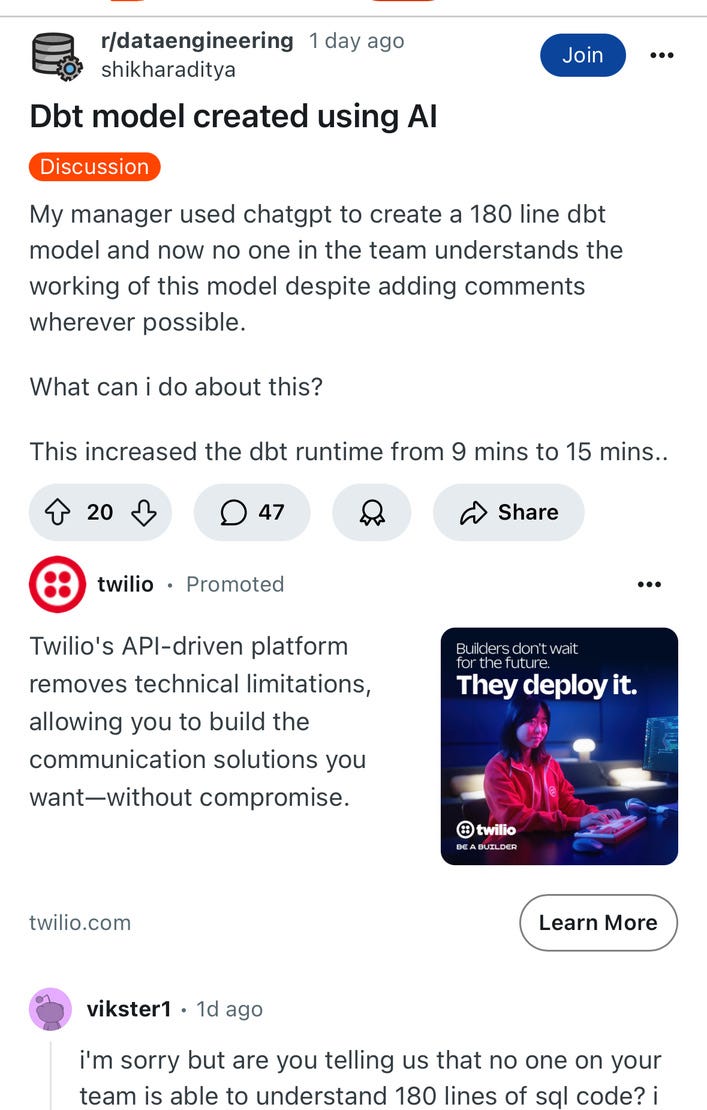There is No "I" in Team. But There's "I" in Vibe.
We're in the FAFO phase of AI and data engineering
This morning, someone in the Practical Data Discord posted a Reddit link about how a manager had used AI to create 180 lines of crappy dbt code. If you read the comments, it’s clear that this was a mess on many levels. The manager had no idea what they were doing, and the team couldn’t make sense of this code. At only 180 lines of code, I would hope that a team of people could at least figure this out.
There’s no “I” in Team, but there’s an “I” in vibe.
When I hear people say that AI will make data engineering obsolete in a few years, I like to point them to examples like this. If today’s results are any indication, we are still a very long way off from AI wholesale replacing data engineers. I’m guessing this is similar in other fields as well. This isn’t to say that AI won’t continue to improve, but at this point, we need to understand that AI is very much a companion to us, and can lead us astray and hurt us if we aren’t paying attention.
AI can help if you’re using it in the right way. I’ve heard this expressed as “guide coding”, where AI assists you in solving problems. I like this a lot. Compare this to vibe coding, where the AI does the work and you’re just a button pusher, pressing return at every step of the way.
As I’ve been saying for a while, you can have AI create as much code as you’d like. That’s not important. The question always comes back to whether you understand what it is you (or AI) built, and whether it adequately addresses the problem you’re solving. If you’re like this manager and team, who doesn’t understand what was built, especially irresponsibly deploying this to production like a maniac, then this is professional negligence and malpractice.
I don’t expect AI to disappear. The speed at which people can iterate and create is too tempting to ignore. There’s also the mother of all bubbles happening right now with investment. It’s argued that without AI spending right now, the economy would be in recession. But that’s a story for another day. Speed on its own is useless if it causes you more harm than good. In this example, the runtime increased by 67%, so the opposite happened. There’s also the indecipherable mess of code that nobody seems to understand. Again, more tech debt and frustration. Apart from the post-mortem learnings that will hopefully ensue, tell me how this is a benefit?
The definition of stupid behavior is hurting yourself while you hurt others. So how do you avoid being stupid? Invest in your team’s skills. Just like Python, SQL, dbt, whatever else you’re using, AI is simply a tool. I won’t blame tools, but I will blame the misuse of tools on laziness or not investing in understanding what one is doing. This means understanding the tools and languages you use and knowing the fundamentals of your craft. If you have the necessary basis and foundational knowledge, and use AI appropriately, you’ll likely see improvements when you incorporate it. As always, RTFM.



Lately, some of the software engineers I'm working with have marked PRs as ready for review even though the code couldn't run to completion or errored out after the first few steps 🤯. I stopped vibe coding after Claude/Cline wrote for me 600+ lines of tests that passed regardless of whether the functions they tested actually worked and then couldn't figure out why.
Great post! It always has to start with « I ». Can’t outsource accountability. BTW, true for « Teams » too. There might be no « I » in it but, there is a « Me » if you try hard enough!